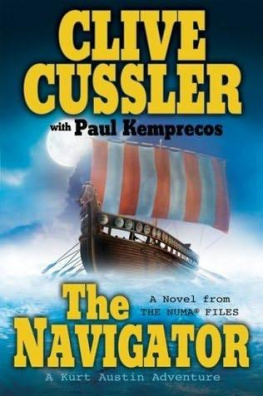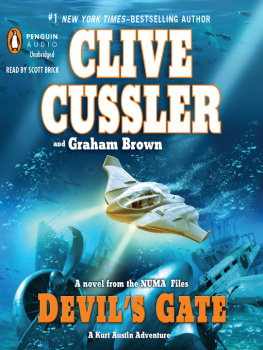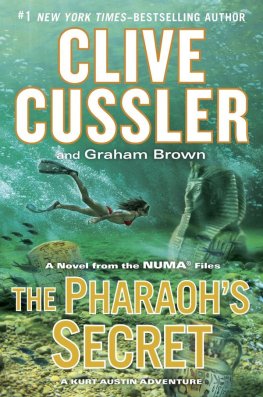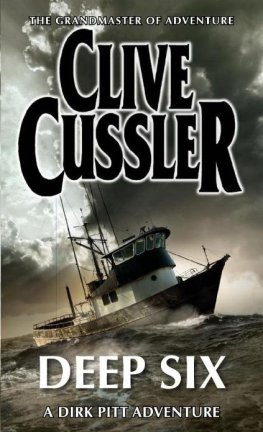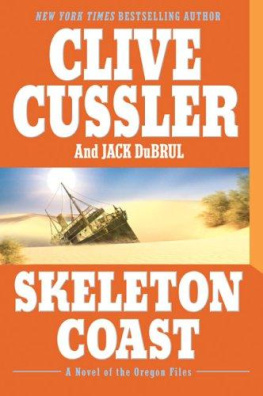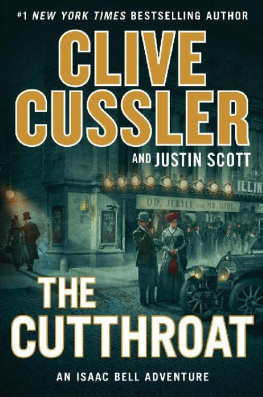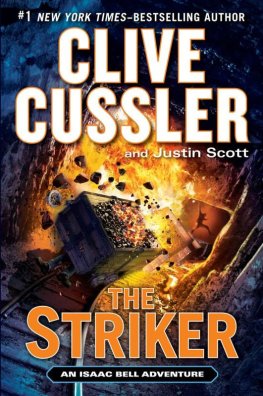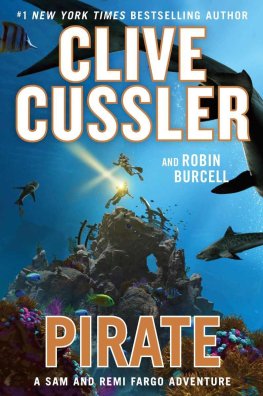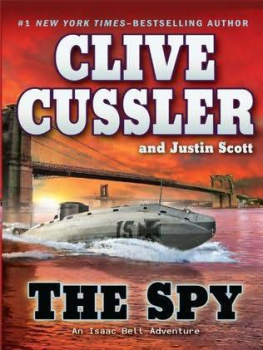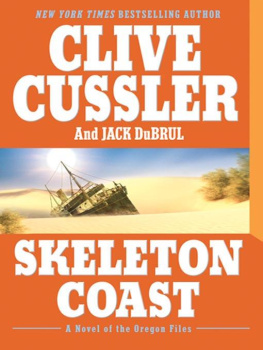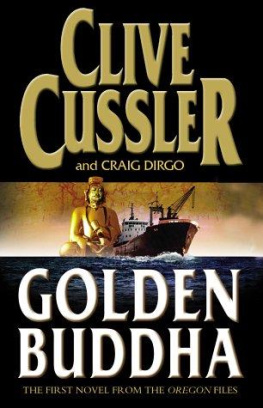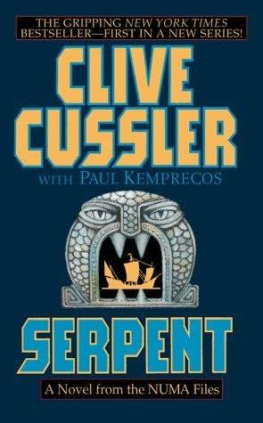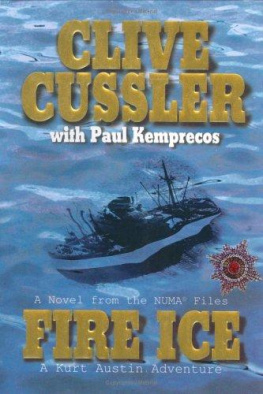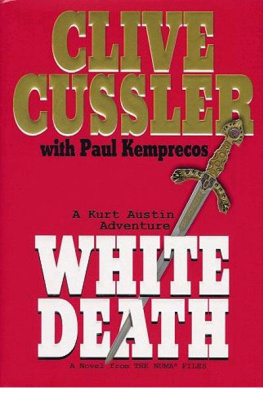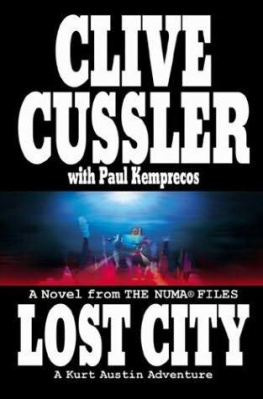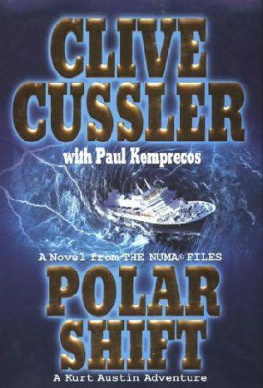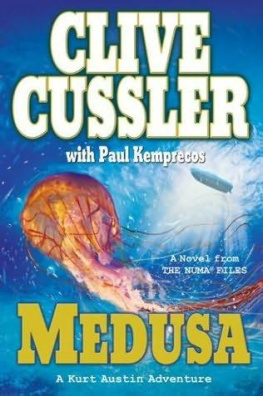Clive Cussler - NUMA 7 The Navigator
Here you can read online Clive Cussler - NUMA 7 The Navigator full text of the book (entire story) in english for free. Download pdf and epub, get meaning, cover and reviews about this ebook. year: 2008, publisher: Berkley Books, genre: Adventure. Description of the work, (preface) as well as reviews are available. Best literature library LitArk.com created for fans of good reading and offers a wide selection of genres:
Romance novel
Science fiction
Adventure
Detective
Science
History
Home and family
Prose
Art
Politics
Computer
Non-fiction
Religion
Business
Children
Humor
Choose a favorite category and find really read worthwhile books. Enjoy immersion in the world of imagination, feel the emotions of the characters or learn something new for yourself, make an fascinating discovery.
- Book:NUMA 7 The Navigator
- Author:
- Publisher:Berkley Books
- Genre:
- Year:2008
- Rating:4 / 5
- Favourites:Add to favourites
- Your mark:
- 80
- 1
- 2
- 3
- 4
- 5
NUMA 7 The Navigator: summary, description and annotation
We offer to read an annotation, description, summary or preface (depends on what the author of the book "NUMA 7 The Navigator" wrote himself). If you haven't found the necessary information about the book — write in the comments, we will try to find it.
NUMA 7 The Navigator — read online for free the complete book (whole text) full work
Below is the text of the book, divided by pages. System saving the place of the last page read, allows you to conveniently read the book "NUMA 7 The Navigator" online for free, without having to search again every time where you left off. Put a bookmark, and you can go to the page where you finished reading at any time.
Font size:
Interval:
Bookmark:
ISBN-10: 0425222365
ISBN-13: 9780425222362
Publisher: Berkley; Reprint edition (June 24, 2008)
* * * * *
THE CONTAINERSHIPOcean Adventure could hold nearly two thousand cargo containers, but even at seven thousand tons and a length of five hundred feet it was a pygmy compared with newer box ships that were as long as three football fields laid end to end. The finer points of spatial relativism were lost on Carina Mechadi as she strode along the ships long deck huddled against the bone-chilling rawness of the North Atlantic.
Since boarding at Salerno, Carina had arisen early each morning and descended from her cabin on the third level of the bridge house to go on a brisk walk before breakfast. Her compulsion was fueled by an unnecessary obsession with keeping her lithe figure in shape and to sooth her impatience at reaching her destination. The number of laps varied according to the weather, which ranged from raw dampness to the bitingly cold air off the coast of Newfoundland.
The Ocean Adventure inspired little of the romance immortalized by Joseph Conrads tales of the doughty tramp steamers that plied the worlds oceans in a bygone age. The ship was a seagoing platform that carried steel container units twenty feet long by about eight feet tall. They were stacked six high and covered most of the deck, except for fore and aft, and narrow aisles on either side. Hundreds more containers were stored belowdecks.
As Carina made her way along the starboard rail, she recalled the chain of events that had brought her to a ship plowing its way across the Atlantic. The murder of Ali Babbas some years before in Baghdad had shocked but not surprised her. Violence always lurked behind the scenes in the high-stakes trade in illegal antiquities. It was a shadowy world where enormous sums of money flowed and gentlemen were rarely found. Ali had probably double-crossed the wrong person.
She had mourned his death nonetheless. Without Ali, it was doubtful she would ever recover the lost cache of antiques. Ali had been the middleman who moved stolen goods to market. He had committed nothing to paper. The names of his buyers and sellers had been in his head. With the sleazy dealer out of the picture, the antiquities she had sought had been scattered to the four winds.
Carina had had plenty to keep her busy once she left Iraq and returned to her UNESCO office in Paris. Months after leaving Baghdad, shed been was on the trail of a rare Etruscan statue when Auguste Benoir visited her office and presented his card. Benoir was a prim, perfidious man who reminded Carina of Agatha Christies fictitious detective Hercule Poirot.
Benoir was a partner in a prestigious Paris law firm, and he got right to the point. My firm has been retained to represent the Baltazar Foundation, he said. Mr. Baltazar is a wealthy businessman and philanthropist. He was quite saddened when he heard about the looting of the BaghdadMuseum. Mr. Baltazar had read an article describing your efforts to find a cache of stolen antiquities, and he is hopeful that with funding from his foundation you could devote your talents to restoring these objects to the Iraqi collection.
Thats very kind of Mr. Baltazar, Carina had replied. However, I believe I can be more valuable working with a worldwide organization like UNESCO.
Forgive me for not being clear about Mr. Baltazars proposition. You would not be required to leave UNESCO.
Carina glanced at the folders piled up on her desk. As you can see, I am buried in UNESCO work.
Understandable. Benoir produced a single sheet of paper from his briefcase. This is the agreement that is being proposed. The foundation would donate an ongoing grant in a bank of your choice. You could draw on the bank account at any time for any purpose, with one stipulation: The money must be spent to recover the Iraqi artifacts. There is no current limit on the funds available.
Suddenly interested, Carina considered the offer. Mr. Baltazar is most generous.
Benoir beamed. Well, Mademoiselle Mechadi?
Carina was in a quandary. She was balancing several UNESCO assignments, but she couldnt let a chance like this pass. She scanned the agreement. Let me study this proposal and Ill call you tomorrow with my answer.
The next day she called Benoir and told him her answer was yes. In her UNESCO job, Carina had worked with governments, international police, museum people, and archaeology experts, but the possibilities of unlimited funding opened up whole new worlds. With wads of cash in her hand, she would be able to buy access to the unsavory characters who populated the antiquities trade. And so it was. Soon she developed an effective network of police and underworld informants who often gave her leads on antiquities missing from countries other than Iraq.
One of her more reliable sources was a crooked Egyptian army officer she knew only as the Colonel. Less than a week before, he had called her out of the blue with the news that the cache of Iraqi objects she had been looking for was being put up for sale by a petty thief named Hassan. She told the officer that she would see him within forty-eight hours, wired him a deposit, and told him to make the buy sight unseen.
The agreement with the Baltazar Foundation required that she keep it informed of immediate developments. She called Benoir with the news about Hassan, and Benoir said he would pass the news along. Before flying to Cairo, she called Professor Nasir in Baghdad and told him that she was close to recovering the cache.
Nasir was delighted, but conditions were still chaotic in Iraq and he was worried about the safety of the collection. He was trying to find funds to set up an efficient record-keeping system for the museums existing collection. Nasir enthusiastically embraced Carinas suggestion that the artifacts be used to leverage donations. He would sign a waiver allowing her to keep the artifacts temporarily in her possession and would contact the Iraqi embassy in Washington to alert the diplomatic staff to the possibility of a tour.
Events moved quickly when she got to Egypt. Over lunch at the Nile Sheraton Hotel, the Colonel said he had already acquired the collection. He gallantly bought her lunch after she had paid him his full fee. That night, in a warehouse on the docks of Port Said, she had waited with growing excitement for the truck that pulled in shortly after midnight.
The artifacts in the truck were covered with dirt, but they were in more or less decent condition. She did a quick inventory by flashlight, writing down a description and number for each item. One of the larger pieces was a tall statue of a man wearing a kilt and conical cap. The bronze surface was caked from grime from the bearded face to the cat at the feet of the figure. The statue didnt appear on her original artifact list, but a wrinkled paper tag affixed to one arm by a string identified the work as the Navigator. After spreading more of Baltazars wealth around the waterfront and the customs office, she had the load put on a freighter that was leaving for Italy.
Flying ahead of the freighter to Salerno, she arranged for the trans-shipment of the cargo to the United States on the Ocean Adventure, and, during the nervous wait, she nailed down the tour plans with Nasir and the embassy. When the freighter finally arrived, she called Benoir and told him she had taken possession of the antiquities in preparation for a tour. He sounded strangely disappointed but called back later, saying he had consulted with Baltazar, who congratulated her on the find. Carina decided not to let the artifacts out of her sight again and had booked a cabin on the containership.
She stopped during her walk now and peered down an alley between stacks to make sure that the blue-painted container was still there. She continued on to the bow, where a blast of icy air hit her as she stepped out onto the open deck.
Next pageFont size:
Interval:
Bookmark:
Similar books «NUMA 7 The Navigator»
Look at similar books to NUMA 7 The Navigator. We have selected literature similar in name and meaning in the hope of providing readers with more options to find new, interesting, not yet read works.
Discussion, reviews of the book NUMA 7 The Navigator and just readers' own opinions. Leave your comments, write what you think about the work, its meaning or the main characters. Specify what exactly you liked and what you didn't like, and why you think so.

